

RDA Toolkit. Ifla lrm august 2017 rev201712 por. Metadata 2nd ed TOC Zeng & Qin. This is the companion website for textbook Metadata 2nd Edition (2016) by Marcia L.ei Zeng and Jian Qin.
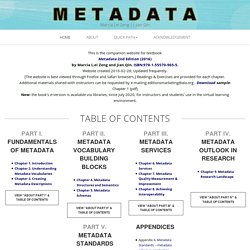
ISBN:978-1-55570-965-5. Website created 2016-02-28; Updated frequently. [The website is best viewed through Firefox and Safari browsers.] Readings & Exercises are provided for each chapter. Additional materials shared with instructors can be requested by e-mailing editionsmarketing@ala.org . The Importance of being LOUD. Documentation For Users · OpenRefine/OpenRefine Wiki. Documentation hub for users Where to start?
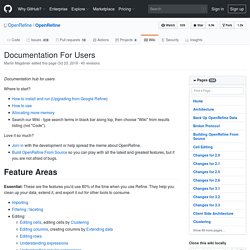
Love it so much? Join in with the development or help spread the meme about OpenRefine.Build OpenRefine From Source so you can play with all the latest and greatest features, but if you are not afraid of bugs. Essential: These are the features you'd use 80% of the time when you use Refine. They help you clean up your data, extend it, and export it out for other tools to consume. Reconciliation: You can use the "reconciliation" support in Refine to link text names in your data to database identifiers (also known as database keys, IDs). Extensions: Add even more features to Refine by installing extensions. For complicated tasks that are commonly done, just follow recipes that other folks have discovered and written up.
Recipes (like removing duplicate row values, etc.) JSTOR Labs. Art Data Model. Introduction The Linked Art Data Model is an application profile that can be used to describe cultural heritage resources, with a focus on artworks and museum-oriented activities.
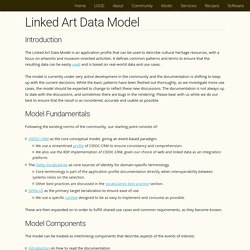
Linked Art. Issue 7: LODLAM. In this paper we present DIVE+, which aims to advance the way in which researchers and general audience interact with heterogeneous online heritage collections by allowing an integrated exploration of objects of these collections.
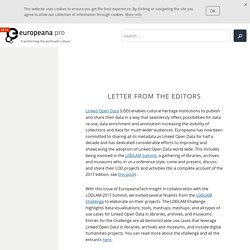
Within the context of DIVE+, we developed various data enrichment and linking strategies, resulting in an interconnected dataset. We especially focus on events. Rather than restricting the type of events, we include named historical events (Second World War), unnamed historical events (The Dutch prime minister making new year’s speech) or personal events (Death of a person). This is in addition to person, concept and location-based enrichments, as events can be combined into event narratives as context for searching, browsing and presenting cultural heritage collection objects.
DIVE+ is the result of a true interdisciplinary collaboration between computer scientists, humanities scholars, cultural heritage professionals and interaction designers. The Linked Open Data Cloud. Proposed: a 4-star classification-scheme for linked open cultural metadata at LODLAM. One of the outcomes of last week’s LOD-LAM Summit was a draft document proposing a new way to assess the openness/usefulness of linked data for the LAM community.
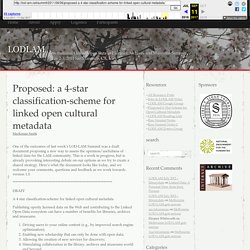
This is a work in progress, but is already provoking interesting debate on our options as we try to create a shared strategy. Here’s what the document looks like today, and we welcome your comments, questions and feedback as we work towards version 1.0. BIBFRAME - Bibliographic Framework Initiative (Library of Congress) Formed in 2009, the Archive Team (not to be confused with the archive.org Archive-It Team) is a rogue archivist collective dedicated to saving copies of rapidly dying or deleted websites for the sake of history and digital heritage.
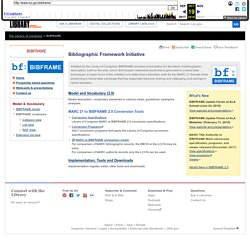
The group is 100% composed of volunteers and interested parties, and has expanded into a large amount of related projects for saving online and digital history. History is littered with hundreds of conflicts over the future of a community, group, location or business that were "resolved" when one of the parties stepped ahead and destroyed what was there. With the original point of contention destroyed, the debates would fall to the wayside. Archive Team believes that by duplicated condemned data, the conversation and debate can continue, as well as the richness and insight gained by keeping the materials.
The main site for Archive Team is at archiveteam.org and contains up to the date information on various projects, manifestos, plans and walkthroughs. Radically Open Cultural Heritage Data on the Web. Jon Voss, We Are What We Do, United States Abstract.
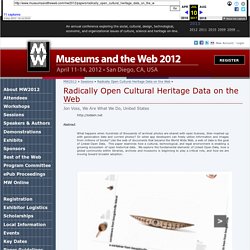
LODLAM – Linked Open Data in Libraries, Archives & Museums. Explore Learning Resources by Competency – Linked Data for Professional Education. Sign in or Join Log in Explore Learning Resources by Competency Browse by Competency How does this work?
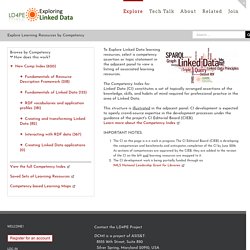
New Comp Index (620) View the full Competency Index Saved Sets of Learning Resources Competency-based Learning Maps To Explore Linked Data learning resources, select a competency assertion or topic statement in the adjacent panel to view a listing of associated learning resources. Art Data Model. The desired target model for Linked Open Data in the Art domain is one with the following properties: Captures as much of the information that we know about the resources as possibleCan be productively used via easy to implement servicesProvides interoperability with other related data setsSolves actual challenges, which are documented as use cases Successful models are developed: iteratively (we will not get it right the first time)responsively (we will change the model in response to feedback and concerns)responsibly (we will consider changes and features carefully with respect to complexity and value)collaboratively (we will engage with the community, projects and individuals early and often) Model Fundamentals Following the existing norms of the community, our starting point consists of: These are then expanded from if necessary in order to fulfill shared use cases and common requirements.
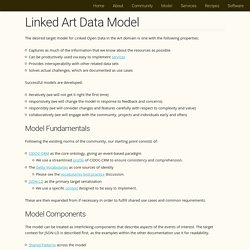
Model Components.